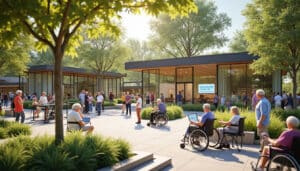Post-acute and rehabilitation care play an essential role in the healthcare journey of patients. They aim to support individuals after hospitalization, to promote their recovery and reintegration into daily life. These services, often provided in specialized facilities or at home, meet various needs ranging from physical rehabilitation to psychological support. Understanding these issues is crucial to ensure appropriate and quality care while considering the specificities of each individual.
Post-acute care and rehabilitation encompass a set of medical and paramedical practices aimed at patients who have completed acute hospital treatment. These services aim to promote the recovery of functional autonomy and to improve the quality of life of individuals, often after a surgical intervention, a severe illness, or a trauma.
The definition of post-acute care is based on the idea that patients may require additional support beyond their hospital stay. This includes specialized facilities such as rehabilitation centers, where multidisciplinary teams work to support patients. These services can cover various areas, from physical rehabilitation to the management of medical treatments.
Among the major challenges of post-acute care and rehabilitation is the importance of continuity of care. This continuity aims to avoid complications and ensure that the transition from hospital to home occurs safely. Coordination among healthcare providers is essential for proper patient follow-up.
The objectives of post-acute care include the restoration of physical capabilities, functional rehabilitation, and improvement of psychological health. Through tailored programs, patients benefit from physical therapies, psychological support, and advice for managing daily activities.
Another aspect of post-acute care is personalized follow-up. It ensures that each patient receives care that corresponds to their specific needs. Whether through regular medical follow-up or workshops led by professionals, the goal is to promote the patient’s independence and their return to a normal life.
It is also important to address the question of funding for post-acute care and rehabilitation. In some countries, these services are partially covered by public health systems, while in others, some costs may fall on the patients themselves. Access to these services can therefore vary significantly, affecting patient care.
In summary, post-acute care and rehabilitation are a key element of the care pathway. They play a fundamental role in the transition between hospital and home, allowing patients to regain their autonomy and lead an active life. The importance of appropriate care should not be overlooked, as it has direct repercussions on the care pathway and patient satisfaction.
Finally, post-acute care and rehabilitation represent an essential approach for any patient needing support after hospitalization. Their success relies on clear objectives, a committed multidisciplinary team, and fluid communication among all stakeholders involved in the healthcare journey.

FAQ on post-acute care and rehabilitation
What are post-acute care and rehabilitation? Post-acute care and rehabilitation are medical services intended for patients who have completed their acute treatment but still require support to regain their autonomy and improve their quality of life.
What are the main objectives of post-acute care? Post-acute care aims to promote patients’ functional recovery, prevent complications, and improve quality of life by enabling them to recover their autonomy.
Who can benefit from post-acute care and rehabilitation? These services are primarily aimed at the elderly, patients who have undergone surgical procedures, or those with chronic conditions requiring rehabilitation.
What types of services are included in rehabilitation? Services may include physiotherapy, occupational therapy, psychotherapy, and other forms of support tailored to the patient’s specific needs.
What structures offer post-acute care and rehabilitation? These services can be provided in various facilities such as hospitals, rehabilitation clinics, and home care services.
How are patients’ progress evaluated? Patients’ progress is assessed through regular follow-ups by healthcare professionals, who adjust care plans based on observed improvements.
What is the impact of rehabilitation on patients’ autonomy? Rehabilitation plays a crucial role in helping patients regain their autonomy, allowing them to lead a more independent and fulfilling life.
Are post-acute care services covered by health insurance? Yes, in many cases, post-acute care and rehabilitation are covered by health insurance, but it is advisable to inquire about specific coverage according to the type of care and the patient’s situation.











